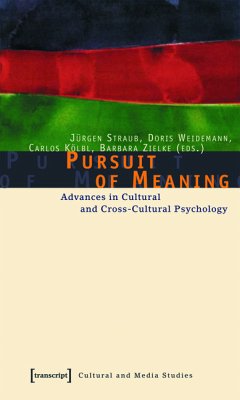The fields of cross-cultural and cultural psychology both acknowledge the role of `culture' for the constitution of a meaningful practice. There are notable differences as well as remarkable commonalities between nomologically oriented cross-cultural psychology on the one hand and interpretive cultural psychology on the other. Contributions to this book discuss recent theoretical and methodological approaches from both fields in order to explore their joint potential for an advancement of the concept of culture, for the theoretical conceptualization and methodical completion of comparative cultural studies and the scientific understanding of cultural difference.
This volume includes contributions by Ernest E. Boesch, Kenneth J. Gergen, Rom Harré, Gustav Jahoda and Jaan Valsiner.
Dieser Download kann aus rechtlichen Gründen nur mit Rechnungsadresse in A, B, BG, CY, CZ, D, DK, EW, E, FIN, F, GR, HR, H, IRL, I, LT, L, LR, M, NL, PL, P, R, S, SLO, SK ausgeliefert werden.









